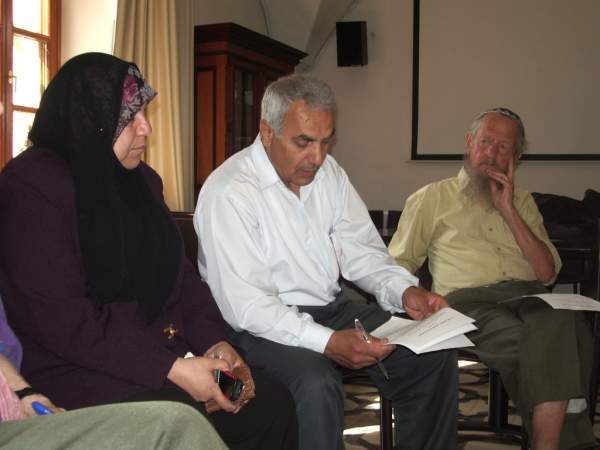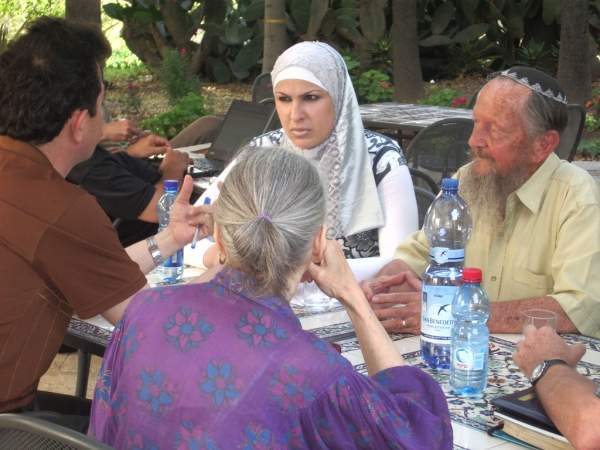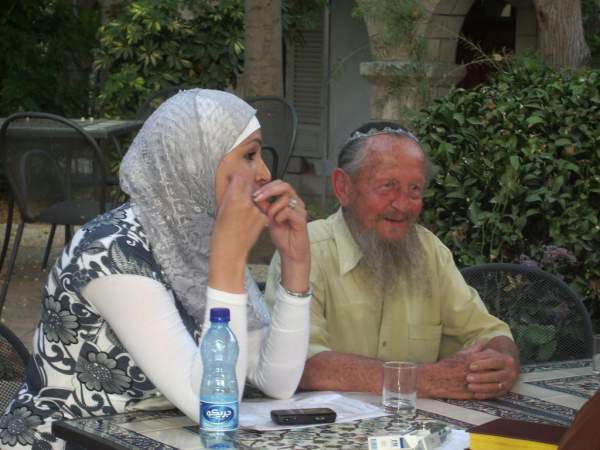By Dr. Yehuda Stolov | Executive Director
How does God communicate with us?
That, in essence, was the question that a group of Palestinian Muslims and Israeli Jews explored over two half-day sessions, Thursday and Friday of last week, at the Austrian Hospice in Jerusalem’s Old City.
We were participating in a joint retreat of the Interfaith Encounter Association, an Israeli organization, and the Palestinian Peace Society.
The Jews were mostly “Anglos,” native English speakers, immigrants to Israel. Professionally the group included two people on the staff of IEA (both of whom have PhDs in topics related to Jewish mysticism!), a hazzan/artist, a teacher, a businessman/rabbi, etc. The Palestinians were all from Hebron or Tulkarm and included a professor, a government official, an accountant, a businessman. Very diverse group.
Fr. Markus Stephan Bugnyar, the rector of the Austrian Hospice (which is NOT what the term “hospice” connotes in contemporary American English – it is, rather, a guesthouse for tourists!) presented the Christian view of revelation. He pointed out how Jews believe the Torah was revealed to Moses, and the Koran was revealed to Muslims, but Christians have no concept similar to this. Jesus did not write any of the gospels himself, in the way that Moses is considered the author of the Torah, or Mohammed the author of the Koran. Further, unlike the Torah, where we see the refrain “God spoke to Moses saying” over and over, phrases like that aren’t used in the New Testament. God does not speak to Jesus – Jesus simply speaks. They take this as a further proof of the divinity of Jesus. When we started discussing the concept of the divinity of Jesus,” Jesus as God,” one of the Muslim participants got quite upset and needed to be calmed down by his co-religionists.
An important ground rule was mentioned by the meeting organizers – we are not there to critique each other’s religions. We were there to hear what Christians have to say about their relationship with the Bible, what Muslims have to say about their relationship with Koran, etc. NOT what Christians think of the Koran or what Muslims think of the New Testament. Keeping that principle in mind is a good way to avoid acrimonious debate that does nothing to further respect for each other.
Rabbi Joel Zeff, Rosh Yeshiva of Yeshivat Hamivtar, presented the Jewish perspective. He talked about the desire of humans to love God and of God to love humans and about the challenge in that as God is infinite and we are finite. The solution comes from the Mystical saying that the whole of Torah is composed of God's names. And as the name represents the essence of the thing, this means that the Torah is the essence of God. God put his thoughts and will in the Torah – we connect with God through the Torah. The Mystics of the Kabala say that when we learn Torah we take its wisdom and put it in our brain, but as the Torah is God's essence – when we do that actually God is in our soul. In this way we make love to God and the main importance of the revelation is the way to do that.
Dr. Taleb Al-Harithi, coordinator of the Palestinian Peace Society presented the Muslim perspective. He talked about how the archangel Gabriel served as an intermediary between God and Mohammed, but just as for the Jews, their holy scripture is believed to contain the word of God. He also spoke about how the Muslims also consider the Torah and the New Testament revelations of the Divine Word. Interestingly he mentioned that Muslims believe in the immaculate conception, the concept that Mary was made pregnant without a physical father, but they don’t take that as meaning Jesus is a physical incarnation of God – they just believe that it was a miraculous pregnancy. They revere the Jewish prophets and Jesus as prophets, some of whom, like Moses, rise to the highest rank of “messenger of God.”
Following each of the presentations we had time for conversation in small groups. Some of the issues that came up were: what brings us closer to God and what take us away from him? Even prophets make mistake – only God is perfect; The most effective love is the one based on the guidance of religion; True lover of God truly loves people; and more.
As is often the case when I’ve been involved in gatherings of the “Abrahamic faiths” we discovered that Judaism and Islam are very close to each other theologically – Christianity is sort of the “odd man out” with a lot of concepts that would appear to be rooted in Hellenistic thought, not Jewish thought. One of the participants asked whether it is better that people be religious, or not? In other words, is religion a force for good, or a force for evil?
I shared the idea that in each of our traditions we can find teachings of love, and teachings of religion can be a powerful force for good and peace. If we focus on the “Torah of hate,” religion can be a powerful force for racism and violence. I think this is why the Baal Shem Tov (the Besht) taught that one has to do teshuva BEFORE studying Torah – for Torah is an amplifier that can make good people better, or, God forbid, bad people worse.
I hope that in future gatherings we will feel comfortable enough with each other to take a look at the “troubling texts” we each have in our traditions, and talk about ways we can defuse them within a religious context. I don’t think we can simply ignore the unpleasant verses in the Koran or the Torah.
All the participants I think left feeling warmly toward everyone. Our challenge is to bring that message to others – the Palestinians need to let their friends know that not all Jews are crazy people bent on oppressing them, and the Jews need to let their friends know that not all Palestinians are latent suicide bombers. Long term, I believe activities like this are essential to building bridges and building peace. If only we could multiply the number of participants geometrically!!!
Based on a blog written by Rabby Barry Leff (who took part in this retreat), adapted by Yehuda Stolov
Project reports on GlobalGiving are posted directly to globalgiving.org by Project Leaders as they are completed, generally every 3-4 months. To protect the integrity of these documents, GlobalGiving does not alter them; therefore you may find some language or formatting issues.
If you donate to this project or have donated to this project, you can receive an email when this project posts a report. You can also subscribe for reports without donating.
Support this important cause by creating a personalized fundraising page.
Start a Fundraiser

